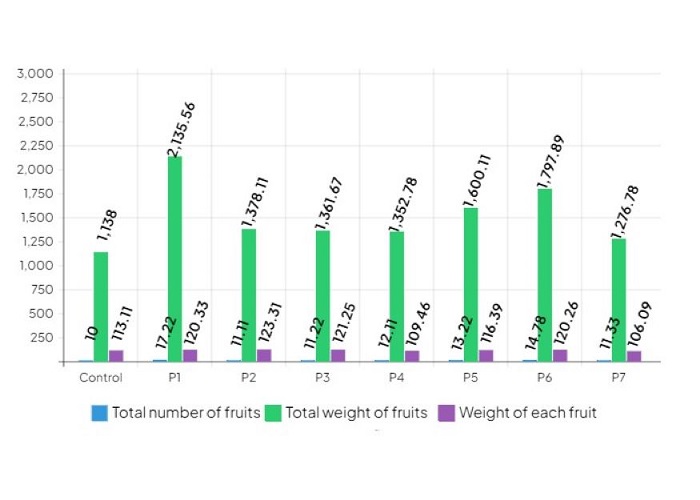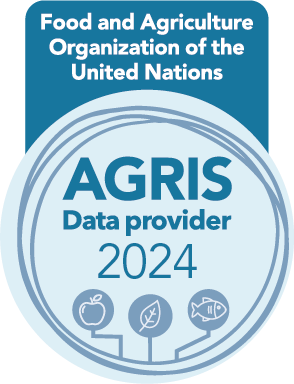Utilization of urban waste as liquid organic fertilizer for vegetable crops in urban farming system
DOI:
https://doi.org/10.14719/pst.2028Keywords:
Liquid organic fertilizer, Urban organic waste, Urban agriculture, Eggplant, Bok choy, MustardAbstract
Converting vegetable, fruit, food, fish offal and slaughterhouse waste that become a problem for the community in the urban areas into useful plant fertilizer is the solution. This study aims to determine (1) the potential of urban organic waste into liquid organic fertilizer and (2) the effectiveness of liquid organic fertilizer (LOF) in increasing the growth and yield of vegetable crops in urban farming systems. The study used Randomized Block Design (RBD) with some treatments P0 (control) and P1 (LOF with 6 types of waste) consisting of P2 (vegetable waste), P3 (fruit waste), P4 (sprouts waste), P5 (food waste), P6 (catfish waste) and P7 (blood waste). The treatment was repeated 3 times for a total of 28 experimental units. The three vegetable plants; eggplant, Bok Choy and mustard, were used in the experiment. The study found that liquid organic fertilizers from vegetables, fruit, sprout, food, fish, blood waste and mixed waste all contain organic matter, varying amounts of nitrogen (N), phosphorus (P), potassium (K), carbon (C), magnesium (Mg), calcium (Ca), copper (Cu), zinc (Zn), iron (Fe) and humic acid. All liquid organic fertilizer treatments increased eggplant and Bok Choy vegetable growth and yield; however, the type of organic waste used as a raw material for LOF did not affect growth but eggplant and Bok Choy yield. LOF from blood waste (P7) and fish waste (P6) has higher measured nutrients and yield from eggplant, Bok Choy and mustard vegetables than other treatments.
Downloads
References
Molano JFG, Alba JDP, Guevara LAP. Characterization of composted organic solid fertilizer and fermented liquid fertilizer produced from the urban organic solid waste in Paipa, Boyacá, Colombia. International Journal of Recycling of Organic Waste in Agriculture. 2021;10:379-95. https://doi.org/10.30486/IJROWA.2021.1901014.1083
Schröder C, Häfner F, Larsen OC, Krause A. Urban organic waste for urban farming: Growing lettuce using vermicompost and thermophilic compost. Agronomy. 2021;11:1175. https://doi.org/10.3390/agronomy11061175
Ahmad SNF, Lee CT, Sarmidi MR, Klemeš JJ, Zhang Z. Characterisation of liquid fertiliser from different types of bio-waste compost and its correlation with the compost. Chemical Engineering Transactions. 2019;72:253-58. https://doi.org/10.3303/CET1972043
Kinantan B, Matondang AR, Hidayati J. Waste management as an effort to improve urban area cleanliness and community income (Journal review). IOP Conf Series: Materials Science and Engineering. 2017;7309:012017. https://doi.org/10.1088/1757-899X/309/1/012017
Grard BJP, Bel N, Marchal N, Madre F, Castell JF, Cambier P et al. Recycling urban waste as possible use for rooftop vegetable garden. Future of Food: Journal on Food, Agriculture and Society. 2015;3(1):21-34.
Komakech AJ. Urban waste management and the environmental impact of organic waste treatment systems in Kampala, Uganda. Doctoral Thesis Swedish University of Agricultural Sciences, Uppsala and Makerere University, Kampala. 2014.
Ddiba D, Andersson K, Rosemarin A, Schulte HH, Dickin, S. The circular economy potential of urban organic waste streams in low and middle income countries. Environment Development and Sustainability. 2022;24:1116-44. https://doi.org/10.1007/s10668-021-01487-w
Dalorima T, Sakimin SZ, Shah RM. Utilization of organic fertilisers a potential approaches for agronomic crops: A review. Plant Science Today. 2021;8(1):190-96. https://doi.org/10.14719/pst.2021.8.1.1045
Fadhilah N, Sedijani P, Mertha IG. The effect of fermentation length and dosage of liquid of organic fertilizer banana peel on the growth of red spinach (Amaranthus tricolor L.). Journal Biologi Tropis. 2021;21(3):907-16. http://dx.doi.org/10.29303/jbt.v21i3.2759
Assefa S, Tadesse S. The principal role of organic fertilizer on soil properties and agricultural productivity a review. Agri Res and Tech. 2019;22(2). https://doi.org/10.19080/ARTOAJ.2019.22.556192
Woldeamanuel AA, Tarekegn MM, Balakrishina RM. Production and application of organic waste compost for urban agriculture in emerging cities. International Journal of Agricultural and Biosystems Engineering. 2022;16(4).
Monisha JN, Rameshaiah GN. Production and comparison of solid – liquid fertilizer from vegetable waste. IJIERT. 2016;3(7):1-7.
Ginandjar S, Frasetya B, Nugraha W, Subandi M. The effect of liquid organic fertilizer of vegetable waste and planting media on growth and yield of strawberry (Fragaria spp) earlibrite cultivar. IOP Conf. Series: Earth and Environmental Science. 2019;334:012033. https://doi.org/10.1088/1755-1315/334/1/012033
Haryanta D, Sa’adah TT, Thohiron M, Indarwati, Permatasari, DF. Aplikasi pupuk organik cair dari limbah organik perkotaan pada tanaman bawang merah (Allium ascalonicum L.). Jurnal Pertanian Terpadu. 2022;10(1):79-91. https://doi.org/10.36084/jpt..v10i1.403
Martínez AB, Martínez CMR, Bermejo A, Legaz F, Quiñones A. Liquid organic fertilizers for sustainable agriculture: nutrient uptake of organic versus mineral fertilizers in citrus trees. PLoS ONE. 2016;11(10). https://doi.org/10.1371/journal.pone.0161619
Sanadi NFA, Lee CT, Sarmidi MR, Klemes JJ, Zhang Z. Characterisation liquid fertilizer from different types of bio-waste compost and it’s correlation with the compost nutrient. Chemical Engineering Transaction. 2019;72. https://doi.org/10.3303/CET1972043
Dlamini MV, Mukabwe WO, Sibandze NN. The effects of organic liquid fertilizer (vegetable waste) on moisture retention, soil physical properties and yield of lettuce (Lactuca sativa L.) grown in the malkerns area, a region in the kingdom of Eswatini. Advances in Agriculture, Horticulture and Entomology. 2021;2020(5). https://doi.org/10.37722/AAHAE.2021502
Iqbal N, Tanveer A, Tahir M, Akram HM, Yaseen M. Effects of different bio-liquids (earthworm wash) on morpho-physiological characteristics of maize. Pak J Agri Sci. 2021;58(2):501-07. https://doi.org/10.21162/PAKJAS/21.630
Menyuka NN, Bob U, Sibanda M. Potential for organic waste utilization and management through urban agriculture. The 56th Annual Conference of The Agricultural Economics Association of South Africa. 2018.
Menyuka NN, Sibanda M, Bob U. Perceptions of the challenges and opportunities of utilising organicwaste through urban agriculture in the durban south basin. Int J Environ Res Public Health. 2020;17(1158). https://doi.org/10.3390/ijerph17041158
Usman I, Nanda PV. Green business opportunity of coffee ground waste through reverse logistics. Journal for Global Business Advancement. 2017;10(6):721-37. https://doi.org/10.1504/JGBA.2017.091941
Richardville K, Egel D, Flachs A, Jaiswal A, Perkins D, Thompson A, Hoagland L. Leaf mold compost reduces waste, improves soil and microbial properties and increases tomato productivity. Urban Agric Region Food Syst. 2022;7(1). https://doi.org/10.1002/uar2.20022
Raden I, Fathillah SS, Fadli M, Suyadi. Nutrient content of liquid organic fertilizer (LOF) by various bio-activator and soaking time. Nusantara Bioscience. 2017;9(2):209-13. https://doi.org/10.13057/nusbiosci/n090217
Tiwow VMA, Adrianton, Abram PH, Hopiyanti N. Production of liquid and solid organic fertilizer from tilapia fish (oreochromis mossambicus) waste using “bakasang” traditional fermentation technology. International Journal of Engineering and Advanced Technology. 2019;8(3S).
Li Z, Wang P, Menzies, Menzies NW, Kopittke PM. Defining appropriate methods for studying toxicities of trace metals in nutrient solutions. Ecotoxicol Environ Saf. 2018;147: 872-80. https://doi.org/10.1016/j.ecoenv.2017.09.044
Bratovcic A, Zohorovic M, Odobasic A, Sestan I. Efficiency of food waste as an organic fertilizer. International Journal of Engineering Sciences & Research Technology. 2018;7(6). https://doi.org/10.5281/zenodo.1299043
Hepsibha BT, Geetha A. 2019. Physicochemical characterization of traditionally fermented liquid manure from fish waste (gunapaselam). Indian Journal of Traditional Knowledge. 2019;18(4):830-36. https://doi.org/10.56042/ijtk.v18i4.29029
Muktamar Z, Sudjatmiko S, Fahrurrozi F, Setowati N, Chozin M. Soil chemical improvement under application of liquid organic fertilizer in closed agriculture system. International Journal of Agricultural Technology. 2017;13(7.2):1715-27.
Nguyen THN, Ng LC, Nuntavun R. The effects bio-fertilizer and liquid organic fertilizer on the growth of vegetables in the pot experiment. Chiang Mai J. Sci. 2018;45(3):1257-73.
Rwoa`a TH, Muna SS, Hussein HM. Synthesis of liquid organic fertilizers from the waste of fishs. Journal of Engineering and Applied Sciences. 2018;13:10621-26. https://doi.org/0.36478/jeasci.2018.10621.10626
Ellyzatul AB, Yusoff N, Mat N, Khandaker MM. Effects of fish waste extract on the growth, yield and quality of Cucumis sativus L. J Agrobiotech. 2018;9(1S):250-59.
Hoa TTH, Duc DD, Thuc TT, Anh TNQ, Co NQ, Rehman H. Efficiency of bio-foliar fertilizer extracted from seaweed and water hyacinth on lettuce (Lactuca sativa) vegetable in Central Vietnam. Pakistan Journal of Agricultural Sciences. 2022;59:1-7. https://doi.org/10.21162/PAKJAS/22.1257
Balmori DM, Domínguez CYA, Carreras CR, Rebatos SM, Farías LBP, Izquierdo FG et al. Foliar application of humic liquid extract from vermicompost improves garlic (Allium sativum L.) production and fruit quality. International Journal of Recycling of Organic Waste in Agriculture. 2019;8:103-12. https://doi.org/10.1007/s40093-019-0279-1
Ranasinghe A, Jayasekera R, Kannangara S, Rathnayake S. Effect of nutrient enriched organic liquid fertilizers on growth of Albemonchus esculentus. Journal of Environment Protection and Sustainable Development. 2019;5(3):96-106.
Ginting N. Utilization of blood meal, slaughterhouse waste and bio gas slurry into fertilizer. Indonesian Journal of Agricultural Research. 2020;03(02):105-15. https://doi.org/10.32734/injar.v3i2.4267

Downloads
Published
Versions
- 01-04-2023 (3)
- 12-01-2023 (2)
- 10-01-2023 (1)
How to Cite
Issue
Section
License
Copyright (c) 2022 Dwi Haryanta, Tatuk Tojibatus Sa’adah, Mochamad Thohiron, Fungki Sri Rezeki

This work is licensed under a Creative Commons Attribution 4.0 International License.
Copyright and Licence details of published articles
Authors who publish with this journal agree to the following terms:
- Authors retain copyright and grant the journal right of first publication with the work simultaneously licensed under a Creative Commons Attribution License that allows others to share the work with an acknowledgement of the work's authorship and initial publication in this journal.
- Authors are able to enter into separate, additional contractual arrangements for the non-exclusive distribution of the journal's published version of the work (e.g., post it to an institutional repository or publish it in a book), with an acknowledgement of its initial publication in this journal.
Open Access Policy
Plant Science Today is an open access journal. There is no registration required to read any article. All published articles are distributed under the terms of the Creative Commons Attribution License (CC Attribution 4.0), which permits unrestricted use, distribution, and reproduction in any medium, provided the original author and source are credited (https://creativecommons.org/licenses/by/4.0/). Authors are permitted and encouraged to post their work online (e.g., in institutional repositories or on their website) prior to and during the submission process, as it can lead to productive exchanges, as well as earlier and greater citation of published work (See The Effect of Open Access).









